| Listing 1 - 10 of 15 | << page >> |
Sort by
|
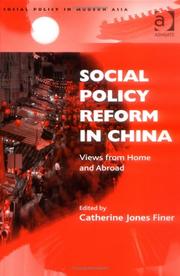
ISBN: 0754631753 Year: 2002 Publisher: Aldershot, Hants ; Burlington, VT : Ashgate,
Abstract | Keywords | Export | Availability | Bookmark
 Loading...
Loading...Choose an application
- Reference Manager
- EndNote
- RefWorks (Direct export to RefWorks)
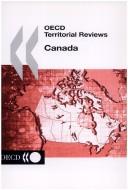
ISBN: 1280006072 9786610006076 9264176306 9264198326 9789264176300 Year: 2002 Publisher: Paris : OECD Publishing,
Abstract | Keywords | Export | Availability | Bookmark
 Loading...
Loading...Choose an application
- Reference Manager
- EndNote
- RefWorks (Direct export to RefWorks)
OECD's Territorial Review of Canada. It finds that Canada is composed of three macroregions: a southern ribbon with all the important metropolitan areas, a zone of rural and non-metropolitan adjacent regions and a sub-continent of remote northern territories. Disparities between these macroregions persist and may even be growing. Opportunities for growth are lost because of these imbalances and also because specific regional advantages are not fully tapped. In many regions, weak local governance is hindering the emergence of local grass-roots projects, diffusion of R&D results to SMEs is slow and dialogue between higher education institutions and firms is poor. This report underlines the need for federal agencies and sectoral departments to continuously assess the consistency of their policies with regard to the three macroregions in order to enhance territorial cohesion and better tailor programmes to local conditions. More federal involvement in metropolitan issues notably through negotiated planning could help to institutionalise and strengthen urban policies. This report also emphasises the significant overhauling of rural policies that took place recently. It underlines that in certain areas such as amenities a strategic approach is still to be defined. Resolving governance issues is a priority in the north.
Canada -- Economic conditions -- 1991-. --- ocial planning --Canada. --- Social planning --Canada. --- Sustainable development -- Canada. --- Sustainable development --- Social planning --- Business & Economics --- Economic History --- Social development planning --- Planning --- Economic history. --- Canada --- Economic conditions --- Economic policy. --- History, Economic --- Economics
Book
ISBN: 9789264063143 Year: 2002 Publisher: Paris : OECD Publishing,
Abstract | Keywords | Export | Availability | Bookmark
 Loading...
Loading...Choose an application
- Reference Manager
- EndNote
- RefWorks (Direct export to RefWorks)
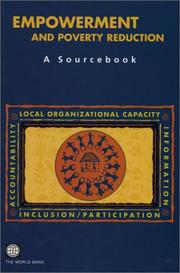
ISBN: 0821351664 9786610085811 1280085819 0585450811 Year: 2002 Publisher: Washington, DC : World Bank,
Abstract | Keywords | Export | Availability | Bookmark
 Loading...
Loading...Choose an application
- Reference Manager
- EndNote
- RefWorks (Direct export to RefWorks)
Third World: economic development problems --- Community development --- Poverty --- Citizen participation. --- Regional development --- Economic assistance, Domestic --- Social planning --- Citizen participation --- Government policy
Book
ISBN: 9789264062757 Year: 2002 Publisher: Paris : OECD Publishing,
Abstract | Keywords | Export | Availability | Bookmark
 Loading...
Loading...Choose an application
- Reference Manager
- EndNote
- RefWorks (Direct export to RefWorks)
Cette série consacrée à la décentralisation en Afrique de l’Ouest et à ses effets au niveau local, territorial et national, montre comment acteurs de tous bords et de tous niveaux impliqués dans un processus général peuvent participer à la relance de l’économie. À partir d’une démarche analytique et pragmatique basée sur des cas concrets (phase d’étude, une phase de dialogue social et de concertation, et une phase de promotion économique et de relance des activités), la décentralisation est étudiée au travers d’une soixantaine de documents téléchargeables. Véritable rupture par rapport aux pratiques du passé, la décentralisation en Afrique de l’Ouest a été étudiée dès 1977 sous l’égide du programme ECOLOC (« Relance des économies locales en Afrique de l’Ouest »).
Economic conditions. Economic development --- Economic geography --- Bobo-Dioulasso --- Community development --- Regional development --- Economic assistance, Domestic --- Social planning --- Citizen participation --- Government policy
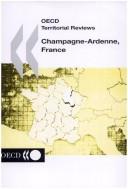
ISBN: 9264175954 9264198008 Year: 2002 Publisher: Paris : OECD Publishing,
Abstract | Keywords | Export | Availability | Bookmark
 Loading...
Loading...Choose an application
- Reference Manager
- EndNote
- RefWorks (Direct export to RefWorks)
The Champagne-Ardenne region in the north-east of France enjoys comparative advantages in a number of sectors, including mechanics, metalworking, packaging and agriculture, and of course Champagne. Although it still ranks fifth among French regions in terms of GDP/capita, Champagne-Ardenne lost ground during the recession of the early 1990s. This report analyses the strategy conducted by the Regional Council to strengthen the catching-up process and diversify the regional economy. It insists on the need to focus on two prime engines of growth: entrepreneurship and foreign direct investment. Moreover, increasing the competitiveness of the region calls for special efforts to help Champagne-Ardenne move towards more knowledge-based economic activities, to stimulate research and to encourage SMEs to network and innovate. While a better balance between agricultural policies and rural policies needs to be found, the region also has an important role to play in fighting urban decay - Champagne-Ardenne is one of the regions in France with the largest proportions of total population living in sensitive urban zones.The report also suggests that the potential for urban development could be enhanced by encouraging co-operation among cities and fostering the establishment of urban networks.
Champagne-Ardenne (France) -- Economic conditions. --- Social planning -- France -- Champagne-Ardenne. --- Sustainable development -- France -- Champagne-Ardenne. --- Sustainable development --- Social planning --- Champagne-Ardenne (France) --- Economic conditions. --- Economic policy. --- Social development planning --- Planning --- Development, Sustainable --- Ecologically sustainable development --- Economic development, Sustainable --- Economic sustainability --- ESD (Ecologically sustainable development) --- Smart growth --- Sustainable economic development --- Economic development --- Environmental aspects --- Champagne-Ardenne, France --- Champagne (France : Province) --- Grand Est (France)
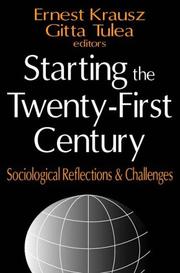
ISBN: 0765800985 0765809486 Year: 2002 Volume: 8 Publisher: New Brunswick (U.S.A.) : Transaction publishers,
Abstract | Keywords | Export | Availability | Bookmark
 Loading...
Loading...Choose an application
- Reference Manager
- EndNote
- RefWorks (Direct export to RefWorks)
Social values --- Social problems --- Social planning --- Jews --- Jewish diaspora --- Valeurs sociales --- Problèmes sociaux --- Planification sociale --- Juifs --- Diaspora juive --- Identity --- Identité --- Problèmes sociaux --- Identité --- Problemes sociaux --- Identite --- Aspect sociologique --- Diaspora --- 21e siecle
Book
ISBN: 9789264295964 Year: 2002 Publisher: Paris : OECD Publishing,
Abstract | Keywords | Export | Availability | Bookmark
 Loading...
Loading...Choose an application
- Reference Manager
- EndNote
- RefWorks (Direct export to RefWorks)
Tzoumerka est une région montagneuse située au nord-ouest de la Grèce. Cette région est confrontée à des défis majeurs en termes de développement, de croissance, de cohésion sociale et de gouvernance. Son économie est fortement dépendante d’activités agricoles traditionnelles dont la survie n’est assurée que par le soutien financier considérable de la Politique Agricole Commune (PAC). Or, ce soutien est malheureusement appelé à disparaître. Les incitations mises en place pour moderniser les activités agricoles et promouvoir d’autres types d’activités économiques se sont avérées inefficaces. La politique de développement local doit à présent prendre un nouvel élan. Il s’agit de modifier les anciennes habitudes de la population locale et de l’inciter à développer ses compétences à travers de nouveaux projets économiques. Les politiques susceptibles d’être les plus efficaces et de générer un nouvel état d’esprit sont celles qui s’appuient sur l’identification et l’essaimage d’un petit nombre d’initiatives heureuses dont les résultats ont été visibles. La transformation des produits agricoles de base en produits à valeur ajoutée est une des stratégies à prendre en compte pour suivre la tendance actuelle de la demande. Il faudrait également exploiter les importantes ressources touristiques de la région afin d’attirer des touristes en quête d’authenticité. L’Examen territorial de Tzoumerka s’inscrit dans un programme plus vaste d’Examens territoriaux, aux niveaux national et régional, menés par le Comité des Politiques de Développement Territorial de l’OCDE. L’objectif général des Examens territoriaux est de fournir des recommandations pratiques aux gouvernements. Les Examens territoriaux portent sur trois types de régions (urbain, intermédiaire, rural). Ils permettent de mieux comprendre les défis auxquels ces régions sont confrontées et identifient des solutions concrètes pour y faire face.
Rural development --- Community development --- Economic development --- Greece --- Development, Economic --- Economic growth --- Growth, Economic --- Economic policy --- Economics --- Statics and dynamics (Social sciences) --- Development economics --- Resource curse --- Regional development --- Economic assistance, Domestic --- Social planning --- Community development, Rural --- Development, Rural --- Integrated rural development --- Rehabilitation, Rural --- Rural community development --- Rural economic development --- Agriculture and state --- Regional planning --- Citizen participation --- Government policy --- Social aspects
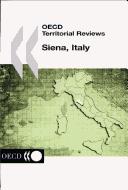
ISBN: 9264197745 9786610082865 1280082860 9264194371 9789264194373 Year: 2002 Publisher: Paris : OECD,
Abstract | Keywords | Export | Availability | Bookmark
 Loading...
Loading...Choose an application
- Reference Manager
- EndNote
- RefWorks (Direct export to RefWorks)
OECD's territorial review of the Italian province of Siena. It finds that Siena, a predominantly rural province in central Italy, has enjoyed steady economic growth throughout the post-war period. This success has its roots in a diverse economy based on manufacturing, services, high-value-added agriculture and a dynamic tourism sector. Nonetheless, it is these last two sectors that give Siena its main competitive advantage: an outstanding concentration of high-quality environmental and cultural resources which are unique to the region. The promotion of different sustainable development initiatives has been motivated by the need to ensure the valorisation and conservation of this major asset. This is most apparent in the effort to ensure that the region's development is not spoilt by the impact of mass tourism and an uncoordinated offer. The agrarian landscape also faces an uncertain future as the bulk of the cultivated land area remains dependent on EU subsidies, notwithstanding the market success of many agricultural producers. To respond to the challenges of sustainable development, Siena needs to fully integrate its development objectives with the most effective means to bring them about, in a co-ordinated and long-term planning exercise.
Sustainable development --- Social planning --- Economic development --- Développement durable --- Planification sociale --- Développement économique --- Siena (Italy) --- Sienne (Italie) --- Economic conditions --- Conditions économiques --- Economic history. --- Siena (Italy : Province) --- Economic conditions. --- Economic policy. --- History, Economic --- Economics --- Siena (Province) --- Provincia di Siena
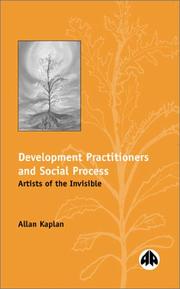
ISBN: 1783715413 1849640041 9781849640046 9781783715411 0745310192 9780745310190 0745310184 9780745310183 0745310192 9780745310190 0745310184 9780745310183 Year: 2002 Publisher: London Pluto
Abstract | Keywords | Export | Availability | Bookmark
 Loading...
Loading...Choose an application
- Reference Manager
- EndNote
- RefWorks (Direct export to RefWorks)
Community development --- Social change. --- Organizational change. --- Community development personnel --- Employees --- Change, Organizational --- Organization development --- Organizational development --- Organizational innovation --- Management --- Organization --- Manpower planning --- Change, Social --- Cultural change --- Cultural transformation --- Societal change --- Socio-cultural change --- Social history --- Social evolution --- Regional development --- Economic assistance, Domestic --- Social planning --- Philosophy. --- Training of. --- Citizen participation --- Government policy --- Social change --- Community organization --- Development aid. Development cooperation --- Social organizations
| Listing 1 - 10 of 15 | << page >> |
Sort by
|

 Search
Search Feedback
Feedback About UniCat
About UniCat  Help
Help News
News